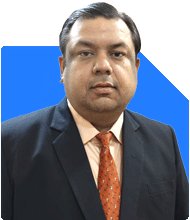Ramalingam Kalirajan |8247 Answers |Ask -Follow
Mutual Funds, Financial Planning Expert - Answered on Jul 10, 2024
He has an MBA in finance from the University of Madras and is a certified financial planner.
He is the director and chief financial planner at Holistic Investment, a Chennai-based firm that offers financial planning and wealth management advice.... more

rediff.com Rediff Gurus Logo Hi Asish Roy | Sign Out HealthHealth MoneyMoney RelationshipRelationship CareesCareer Ask your questions about health, money, relationship or careers here Ask Anonymously Asish Asish 1 Questions 0 Answers 0 Gurus 0 Bookmarks These questio I am 48 yrs old working for central government. My monthly gross income is around 1.25 L. My contribution towards savings is 6 k in PF, vdpf 25 k, total accumulated in PF till date is 22 L. I have one PPF account and SSY account, contributions around 2.5 L in both, accumulated amount till date is around 18 L. SIP is 4 k pm. I have built my house and bought a car with EMI 16.5 k and 8.5 k pm. I have rented a part of my house and getting around 18 k. My monthly expenses is around 55 k in a tier 2 city. I am eligible for pension after retirement under old pension scheme. Pls advise how to maximize my investments. Till now as a govt employee I only put my investments in secured way but Stories are getting different henceforth as my kids have turned 15 and 8 now. I need your advice how to plan my life in investment. Thanks in advance.
Age: 48 years
Monthly Gross Income: Rs 1.25 lakh
Savings Contributions:
Provident Fund (PF): Rs 6,000/month, accumulated Rs 22 lakh
Voluntary Provident Fund (VPF): Rs 25,000/month
Investments:
Public Provident Fund (PPF) and Sukanya Samriddhi Yojana (SSY): Contributions of Rs 2.5 lakh, accumulated Rs 18 lakh
SIP: Rs 4,000/month
Liabilities:
House EMI: Rs 16,500/month
Car EMI: Rs 8,500/month
Rental Income: Rs 18,000/month
Monthly Expenses: Rs 55,000
You are eligible for a pension under the old pension scheme, providing a secure income post-retirement.
Genuine Compliments and Empathy
First, congratulations on maintaining a disciplined savings habit. Your commitment to financial security is evident. You've invested wisely in secure options, which is commendable. It's natural to seek advice as your children grow older and financial needs evolve.
Analyzing Current Investments
Provident Fund (PF):
Advantage: Safe, government-backed, tax-efficient.
Assessment: PF contributions are good for long-term security. With Rs 22 lakh accumulated, you're on track.
Voluntary Provident Fund (VPF):
Advantage: Additional savings with similar benefits to PF.
Assessment: Rs 25,000/month is significant. It's a safe, low-risk option but may limit growth potential.
Public Provident Fund (PPF) and Sukanya Samriddhi Yojana (SSY):
Advantage: Tax benefits, secure returns, long-term growth.
Assessment: Rs 18 lakh accumulated shows disciplined investing. Good for children's future needs.
Systematic Investment Plan (SIP):
Advantage: Regular investing, rupee cost averaging, compounding benefits.
Assessment: Rs 4,000/month is a good start but consider increasing for better growth.
Recommendations for Maximizing Investments
Increase SIP Contributions:
Why: Equity mutual funds have higher growth potential.
How: Gradually increase SIP contributions to enhance equity exposure and long-term returns.
Diversify Mutual Fund Portfolio:
Current Allocation: Focused on secure investments.
Recommendation: Add more equity mutual funds for higher returns. Consider large-cap, mid-cap, and hybrid funds.
Review EMI and Expenses:
EMI Management: House and car EMIs total Rs 25,000/month.
Recommendation: Ensure they fit within your budget without affecting savings. Prioritize early repayment if possible.
Rental Income Utilization:
Current: Rs 18,000/month.
Recommendation: Allocate rental income towards SIPs or debt repayment to maximize returns or reduce liabilities.
Understanding Mutual Fund Categories
Equity Mutual Funds:
Description: Invest in stocks, suitable for long-term growth.
Risk: High
Return Potential: High
Debt Mutual Funds:
Description: Invest in fixed-income securities, suitable for stability and regular income.
Risk: Low to Moderate
Return Potential: Moderate
Hybrid Mutual Funds:
Description: Invest in a mix of equity and debt, offering balanced returns and risk.
Risk: Moderate
Return Potential: Moderate to High
Advantages of Actively Managed Funds
Professional Management:
Experienced fund managers make informed investment decisions.
Active Monitoring:
Fund managers continuously monitor market conditions and adjust portfolios accordingly.
Potential for Higher Returns:
Actively managed funds can outperform indices through strategic stock selection.
Disadvantages of Index Funds
No Active Management:
Index funds simply replicate an index without active decision-making.
Limited Potential for Outperformance:
Index funds match the market returns, but actively managed funds can outperform.
Market Risks:
Index funds are subject to all market risks as they track the entire index.
Disadvantages of Direct Funds
No Advisory Support:
Direct funds require investors to make decisions without professional guidance.
Complexity:
Choosing the right fund and managing investments can be challenging without expert advice.
Benefits of Investing through MFD with CFP Credential
Expert Guidance:
Certified Financial Planners (CFP) provide tailored advice based on your financial goals.
Comprehensive Financial Planning:
CFPs consider all aspects of your financial situation, ensuring a holistic approach.
Regular Monitoring and Rebalancing:
CFPs regularly review your portfolio and make necessary adjustments.
Power of Compounding
Definition:
Compounding is the process where returns generate more returns over time.
Impact on Investments:
Compounding significantly grows your investments, especially with regular SIPs over a long period.
Example:
Investing Rs 10,000 monthly with an annual return of 12% can grow substantially over 20 years due to compounding.
Risk and Return Assessment
Equity Funds:
High risk but potential for high returns. Suitable for long-term goals.
Debt Funds:
Lower risk, stable returns. Suitable for conservative investors.
Hybrid Funds:
Balanced risk and returns. Good for moderate risk appetite.
Final Insights
Your disciplined savings and secure investments have provided a strong financial foundation. However, to maximize your investments, consider increasing your SIP contributions and diversifying into more equity mutual funds. Utilizing your rental income for additional investments or debt repayment can further enhance your financial position. Consulting a Certified Financial Planner ensures you receive expert guidance tailored to your goals.
Key Takeaways:
Diversify and rebalance your portfolio regularly.
Review fund performance and make adjustments as needed.
Consider increasing allocation to large-cap funds for stability.
Consult a Certified Financial Planner for personalized advice.
Your approach shows discipline and foresight. With these improvements, you’re well on your way to a secure financial future.
Best Regards,
K. Ramalingam, MBA, CFP
Chief Financial Planner
www.holisticinvestment.in
You may like to see similar questions and answers below
Ramalingam Kalirajan |8247 Answers |Ask -Follow
Mutual Funds, Financial Planning Expert - Answered on Apr 16, 2025
Ramalingam Kalirajan |8247 Answers |Ask -Follow
Mutual Funds, Financial Planning Expert - Answered on Apr 16, 2025
Ramalingam Kalirajan |8247 Answers |Ask -Follow
Mutual Funds, Financial Planning Expert - Answered on Apr 16, 2025
Ramalingam Kalirajan |8247 Answers |Ask -Follow
Mutual Funds, Financial Planning Expert - Answered on Apr 16, 2025
Ramalingam Kalirajan |8247 Answers |Ask -Follow
Mutual Funds, Financial Planning Expert - Answered on Apr 16, 2025

Understanding the Investment Style
Let us examine if your understanding of style is accurate.
Yes, the mid cap fund you are favouring has a quality-style tilt.
It typically invests in companies with strong balance sheets and consistent earnings.
These companies may not always deliver sudden outperformance. But they offer stability.
Its portfolio avoids speculative bets. It prefers firms with high return on equity and low debt.
Many of its holdings show a mix of stable management and focused execution.
This is the key element of a quality investing approach. Your observation is correct.
Morningstar and Value Research ratings are useful. But they should not be the only factors.
Review its stock selection behaviour over time. That gives true insight into its core style.
Even during volatile market phases, this fund tends to stick to predictable compounders.
It rarely chases valuation or trending sectors just to boost short-term returns.
Thus, you’re not just adding a mid cap fund. You are adding consistency to your core.
It also reduces downside risks when markets correct. Very important for peace of mind.
Quality investing is not flashy. But it builds strong wealth in the long term.
So, yes, this fund aligns with quality-oriented investing. Your style assessment is spot on.
Evaluating the Decision: Quality vs Quality-Growth Blend
Now let’s evaluate the choice between the two mid cap schemes. Both are good performers.
But there are finer nuances we must assess.
One fund is a quality-growth blend. It combines strong fundamentals with higher growth.
This makes it slightly aggressive in sector allocation and stock rotation.
It is more likely to tilt towards trending sectors if the fundamentals look good.
This means it may shine during high-growth cycles. But it may underperform in corrections.
The second fund (your chosen one) is strict about quality. It avoids fast-moving bets.
It sacrifices short-term alpha for long-term steady compounding.
So yes, the fund you’re leaning toward is more consistent in style application.
That consistency helps in building discipline in your portfolio behaviour.
You already hold a momentum-based fund. So you do have some cyclic exposure.
Choosing the quality-focused fund gives balance. It reduces duplication of risk.
The overlap analysis you have done is very relevant. It shows your strategic thinking.
Overlap is not just about stock duplication. It affects how your overall portfolio behaves.
With lower overlap, you avoid concentration risk. That’s excellent long-term thinking.
Quality-style funds also tend to have lower portfolio churn. That saves hidden costs.
Overlap with your momentum fund is just 15%. That’s very healthy and preferred.
The 27% overlap in the quality-growth blend is not small. It can reduce diversification benefits.
Also, if two funds behave similarly in corrections, your portfolio feels more volatile.
Diversified styles smooth out the investor experience. That keeps SIPs and discipline intact.
So, your choice to favour the quality fund is technically sound and emotionally smart.
Even from a tax efficiency angle, less churn in the portfolio helps reduce unnecessary exits.
That improves post-tax returns without chasing market cycles.
Active Management vs Index Investing
Let us now address the index component you mentioned.
You hold a momentum index-based fund. While it has delivered returns in some periods, index funds come with certain drawbacks.
Index funds are passive. They do not respond to market risks or stock downgrades.
If a company in the index performs poorly, the index fund continues holding it.
Active funds, managed by skilled fund managers, can exit such stocks early.
This protects your capital. Passive funds cannot do this due to their mandate.
Index funds also get over-exposed to top sectors. This increases cyclical risk.
Actively managed funds adjust sector allocations based on valuation and growth.
This flexibility is a big plus during market stress or sudden global events.
Your move toward actively managed quality mid caps is hence a better portfolio decision.
Direct vs Regular Plans
Your question indirectly involves making fund choices. This is a good time to highlight one more thing.
If you are using direct funds to invest, please consider the disadvantages of that route.
Direct funds skip distributor commission. But they also skip professional guidance.
Without a Certified Financial Planner, it’s hard to review portfolio strategy consistently.
Many investors use direct funds but panic during corrections. They exit at the wrong time.
Regular plans taken through an MFD with CFP credentials give ongoing handholding.
They assist with rebalancing, goal alignment, and behavioural coaching.
They also give reminders, reports, and tax-saving insights which improve your experience.
The small cost of regular plan is easily recovered through better decision-making.
So, if you are using direct funds now, switch to regular via an expert-led process.
Mid Cap Strategy in Your Portfolio
Let us assess your mid cap exposure in the big picture.
You already hold a strong small cap fund. That gives you high growth potential.
You also hold a momentum fund. That adds cyclicality and tactical sector exposure.
Your value fund gives stability through contrarian investing.
So your portfolio is already well-thought-out. Just missing a consistent mid cap core.
Choosing a quality-focused mid cap fund completes your core strategy.
It gives long-term compounding without style drift.
It does not add overlap risk with your existing funds.
It adds predictability, which is important for wealth protection.
Behavioural Fit and SIP Discipline
Let’s not forget emotional comfort. This plays a big role in long-term wealth creation.
Quality-style funds do not surprise you with wild swings.
This keeps your SIPs on track even during temporary underperformance.
Investors with erratic funds tend to pause or redeem SIPs due to fear.
This breaks compounding. You have chosen wisely to avoid that.
The fund you are leaning toward has shown consistency in tough years like 2020 and 2018.
This is proof that it follows a clear, disciplined investment process.
Such discipline helps both the fund and the investor stay aligned.
Finally
You’re making a very thoughtful portfolio addition. Let us summarise your situation in short.
You understood styles well. You compared overlap smartly. That is impressive.
The quality mid cap fund fits your portfolio gap. It adds stability and discipline.
You are not missing out by not choosing the blended fund. It would increase overlap.
Momentum exposure is already present in your portfolio. No need to duplicate that.
Your asset mix is now better diversified across growth, value, momentum and quality.
That’s the essence of portfolio engineering. Balanced risk with multiple growth paths.
Your strategy shows clarity and a 360-degree mindset. Stay consistent and review yearly.
Choose regular plans via a Certified Financial Planner. That helps with rebalancing and guidance.
Keep a patient SIP journey. Your decisions are already in the right direction.
Best Regards,
K. Ramalingam, MBA, CFP,
Chief Financial Planner,
www.holisticinvestment.in
https://www.youtube.com/@HolisticInvestment
Best wishes for your journey!
Best Regards,
K. Ramalingam, MBA, CFP,
Chief Financial Planner,
www.holisticinvestment.in
https://www.youtube.com/@HolisticInvestment
Yogendra Arora |32 Answers |Ask -Follow
Tax Expert - Answered on Apr 16, 2025
Anu Krishna |1590 Answers |Ask -Follow
Relationships Expert, Mind Coach - Answered on Apr 16, 2025
Ramalingam Kalirajan |8247 Answers |Ask -Follow
Mutual Funds, Financial Planning Expert - Answered on Apr 16, 2025
Ramalingam Kalirajan |8247 Answers |Ask -Follow
Mutual Funds, Financial Planning Expert - Answered on Apr 16, 2025
Ramalingam Kalirajan |8247 Answers |Ask -Follow
Mutual Funds, Financial Planning Expert - Answered on Apr 16, 2025



















